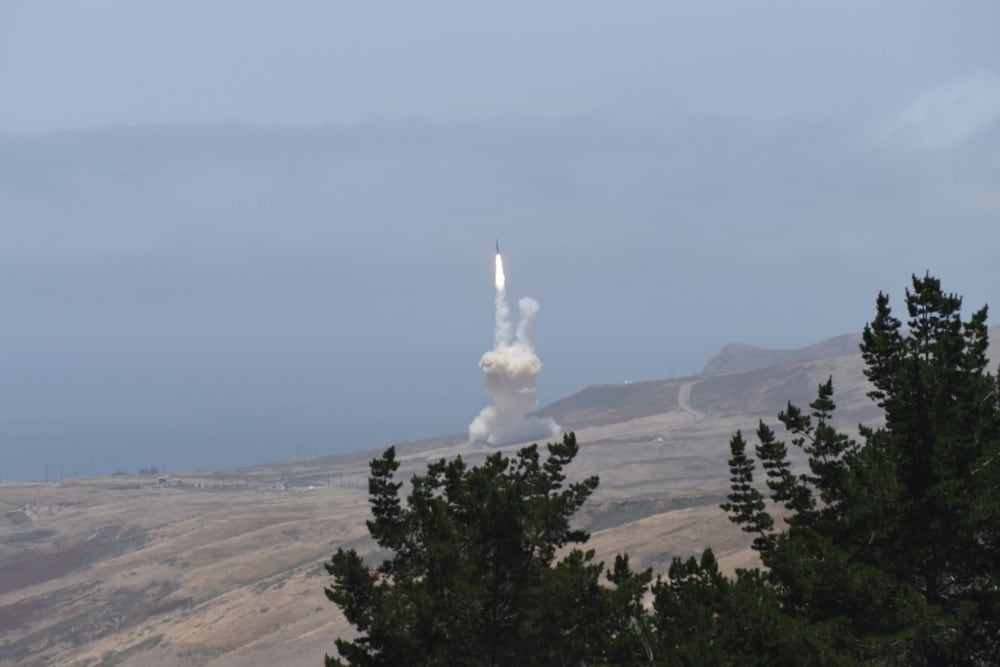WASHINGTON — The U.S. Missile Defense Agency plans to hold a competition that could split up the work among contractors to modernize and sustain America’s missile defense system, which is designed to destroy intercontinental ballistic missile threats.
Boeing has held the development and sustainment contract for the Ground-based Midcourse Defense systems in place at Fort Greely, Alaska, and Vandenberg Air Force Base, California. Boeing’s contract is set to expire in 2023.
The GMD system is made up of more than 44 Ground-Based Interceptors buried in silos in the ground along with ground control stations, detection and fire control systems, and other support infrastructure.
Boeing received a sole-source $6.6 billion award in 2018 to build a new silo and 20 more GBIs, as well as to sustain the system.
But Vice Adm. Jon Hill, the MDA’s director, told an audience in March at an Association of the U.S. Army event that “we know that contract is not giving us everything that we need for the future, so we are going to compete that contract downstream.”
The agency is working to develop a Next-Generation Interceptor that would replace the current GBIs with more capable interceptors. Its plan to upgrade the GBI’s exoatmospheric kill vehicle with a redesigned version was canceled in 2019 due to technical problems. Rather than rework that program, the agency decided to design an entirely new interceptor and stop building new GBIs.
A request for proposals for the NGI is due imminently.
But along with a new NGI, “we are going to make sure that ground systems, sensors and fire control, all the rest of the system, we have the opportunity to inject that competition because I think that is very important,” Hill said.
RELATED

The MDA previously considered splitting up the contract several times, believing that would reduce cost and create efficiency in the program, but nothing materialized toward that goal.
This time, the MDA has released two requests for information with the possibility of splitting up the contract. The most recent RFI was posted on Beta.Sam.Gov in March.
“I will tell you that our lead system integrator does a great job today and the partnerships with industry within that construct do a great job, but we think that it’s so large and complex we should be doing everybody a favor by being able to split that up without losing the integration among all those pieces,” Hill said, “so our intent is to move in that direction.”
The agency “is exploring different approaches for fulfilling the GMD Program Element requirements. Acquisition approaches under consideration range from an award of multiple contracts to execute segments/missions of the program scope to a single contract to execute the entirety of the program scope,” the RFI states. “Essential to all of the acquisition approaches under consideration is the establishment of an enduring arrangement strategy for the execution of the [Weapon Systems Integration (WSI)] functions across the program lifecycle, either under a single prime contract, or as one of the multiple contracts.”
The RFI lays out a possible plan to split up the contract into five pieces. One contractor would provide the NGI, which is being addressed through a separate request for proposals. Another would be responsible for legacy and future ground systems, and another for sustaining the existing GBIs.
And a company would operate the weapon system along with military operators and would run fleet maintenance scheduling and deconfliction, site operations, test support, and depot and parts management, the RFI lays out.
Lastly, a contractor would serve as the weapon systems integrator, making it responsible for overall GMD integration “including physical and logical integration of the GMD components, GMD system and MDA enterprise level integration, planning and execution of all necessary testing to verify and validate overall requirements compliance,” the RFI states.
Responses to the RFI are due April 10.
Jen Judson is an award-winning journalist covering land warfare for Defense News. She has also worked for Politico and Inside Defense. She holds a Master of Science degree in journalism from Boston University and a Bachelor of Arts degree from Kenyon College.








